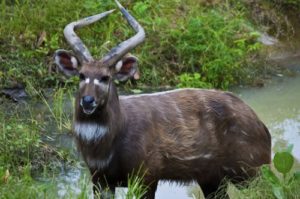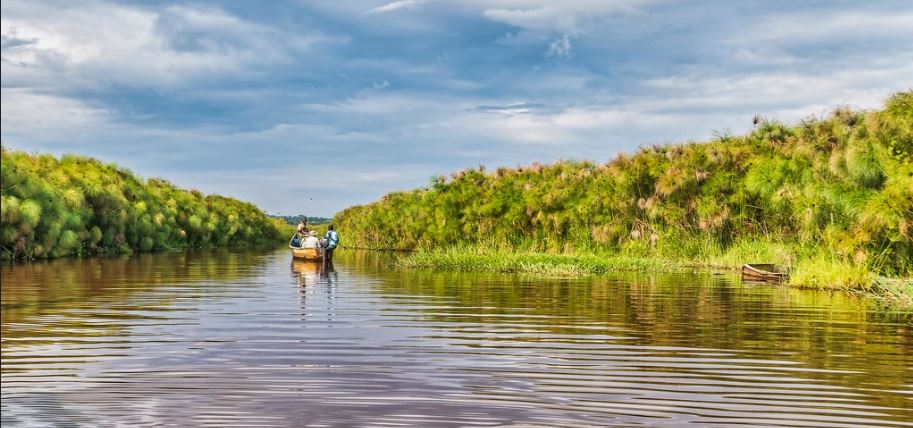The Mabamba Swamp is named after the lungfish whose local name is “emamba” – a delicacy for the shoebill stork. The marsh-filled Swamp is arguably the best place to see the shoebill in Uganda, and also one of the top birdwatching spots in Uganda.
Located on the mighty Lake Victoria, Mabamba Swamp is popular for shoebill tracking tours. Besides, the shoebill stork, there are quite a number of other birds that inhabit this swamp, these include the blue swallow, pallid harrier, papyrus gonolek, swamp flycatcher, pigmy goose, lesser jacana, white-winged warbler, Viellot’s weaver, grosbeak weaver, black-headed weaver, northern brown-throated weaver, Clarke’s weaver, palm-nut vulture and Carruther’s cisticola among others. The swamp is approximately 45 minutes by boat from the Nakiwogo Landing site In Entebbe.
Since the swamp is close to the Entebbe International Airport, it is a perfect starting point for all those booked on a safari in Uganda.
What to see & do in Mabamba Swamp
- Shoebill Tracking.
- Spend a Day with the Fishermen Listening to Folk Stories.
- A glance at the Endangered Sitatunga antelope.
- Spot fishing.
- Watching Butterflies.
-
Shoebill Tracking In Mabamba Swamp
Mabamba swamp is popular for its shoebill tour where you can spot these species from a closer point of view. The best time to view these birds is in the morning when you stand a chance of spotting them prey on the lungfish or frogs. Local experienced guides will assist in interpreting and mentioning the names of the bird species as you spot them On the tour.
-
Meet the local fishermen
Meet the transformed locals who in the past hunted and killed the shoebill stork since both the locals and the shoebill competed for the same food (lungfish). Over the years, these locals have been trained and transformed into local site guides who now strive to preserve both the birds and the swamp.
In a bid to continuously support the ongoing conservation of this bird haven, all our Mabamba Tours are guided by local site guides.
A glance at the Endangered Sitatunga antelope

Mabamba Swamp is a well-known sanctuary that is home to the endangered Sitatunga antelopes. When you are on your bird-watching tour, you are most likely to encounter these elusive antelopes in the area. These endangered species are a treat to the eyes as you witness them in their natural habitat. Over the past few years, their population has dwindled because of poaching.
Read more about the Endangered Sitatuga of Uganda.
-
Spot fishing
Before Mabamba Swamp became popular, fishing was the main activity in this entire region of Uganda. Fishing is still considered to be the main economic activity in the area and has become a popular sight to spot an abundance of fish species. You can spot popular species such as Tilapia, mudfish, lungfish, and the large Nile Perch while on your fishing tour in Mabamba Swamp. You can see many fishermen in the area and even join them or watch them do the fishing. If you wish to join them make sure you take your own equipment with you and begin your fishing tour. **Realm Africa Safaris™ can arrange fishing equipment for you at a cost.
-
Watching Butterflies
Bird watching is the main highlight of the Mabamba Swamp but apart from the shoebill storks and other bird species, you can spot countless butterfly species that will leave you awestruck. The swamp is home to more than 200 species of butterflies that have attracted tourists from all walks of life. You can spot the most common species like Acraea Consanquine, Acraea aganice, Achaea aurivilli, Bicyclus sebetus, Abisaraneavei, and many others that will make your birding tour more interesting and exciting.
Best time to visit Mabamba Swamp
The Mabamba swamp can be visited at any time of the day but if you wish to enjoy the birding tour, it is best you go in the morning hours. Make sure you carry your sunglasses, hats, insect repellent, sun protection, and a rain jacket in case it rains. The climate of Mabamba swamp is the same as in other areas of Lake Victoria which has an average temperature of 17°C and a maximum temperature of 26°C
Getting to Mabamba Swamp
By Car ( Entebbe/Kampala):
Following the Kawuku – Nakawuka road, drive approximately 41.5km (1 hour 15 minutes) on a dirt road. This drive can be longer in the wet season months of May & November – remember to find out the road Status.
By Bicycle ( from Entebbe):
If you are a bicycle lover, you can opt to cycle your way to Mabamba Swamp in the company of a trained local cyclist guide. Cycling to Mabamba takes ± 2 hours. The route is through the local villages and therefore you get a better insight into the daily life of the locals.
By boat ( from Entebbe – Nakiwogo Landing site)
Getting to Mabamba Swamp by boat is our preferred style. We get you onto a motorized wooden canoe at the Nakiwogo landing site. The trip to Mabamba will last 45 minutes (one way) and is a lot more rewarding for bird lovers, as you get to see a lot more birds than when you travel by bicycle or car.
THE UGLY TRUTH ABOUT MABAMBA SWAMP
Mabamba Swamp is home to well over 260 bird species including the shoebill stork and the swamp-dwelling sitatunga antelope – both endangered species near to extinction if their habitat is not protected from human encroachment.
We can work together to ensure both the shoebill and sitatunga don’t get to the point of extinction. Below are two (02) ways we think you can help save both the sitatunga and Shoebill Stork on Lake Victoria from becoming extinct.
How can I help protect the near-to-extinction (endangered) shoebill stork?
- Visit the Mabamba Swamp:
A visit to Mabamba Swamp does help increase awareness and also brings in some money that supports the Mabamba Bay Community Action Plan (MWETA) programs. Out of the fee you pay for the Mabamba Swamp Tour with Realm Africa Safaris™, up to 15% is ploughed back into Shoebill Conservation information of permit fees paid to MWETA Programmes. Book your tour now and save the endangered Shoebill from going extinct – together we can do this.
- Donate to the Mabamba Swamp Conservation Programme:
Interested parties can also take part in saving the near-to-extinction shoebill by directly donating money to the conservation program. This money can be to implement the various conservation plans by the Mabamba Bay Wetland Eco-Tourism Association (MWETA). For example, the money can be Used to further train more shoebill tracking site guides this way people will be equipped to earn from the shoebill track giving them an even better reason to protect and conserve the shoebill and its habitat – the swamp on Lake Victoria.
Popular Daily Shoebill Tracking Tours visiting Mabamba Swamp

